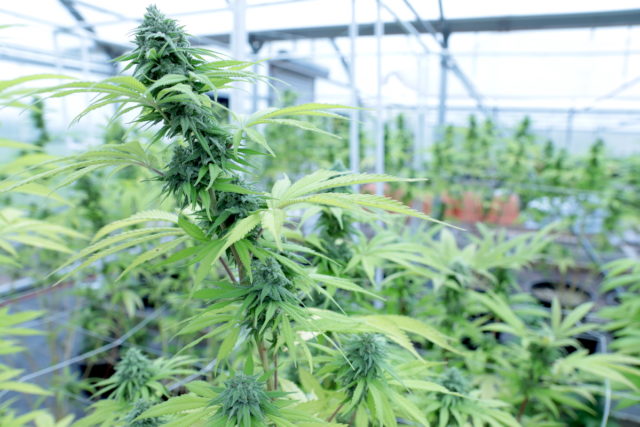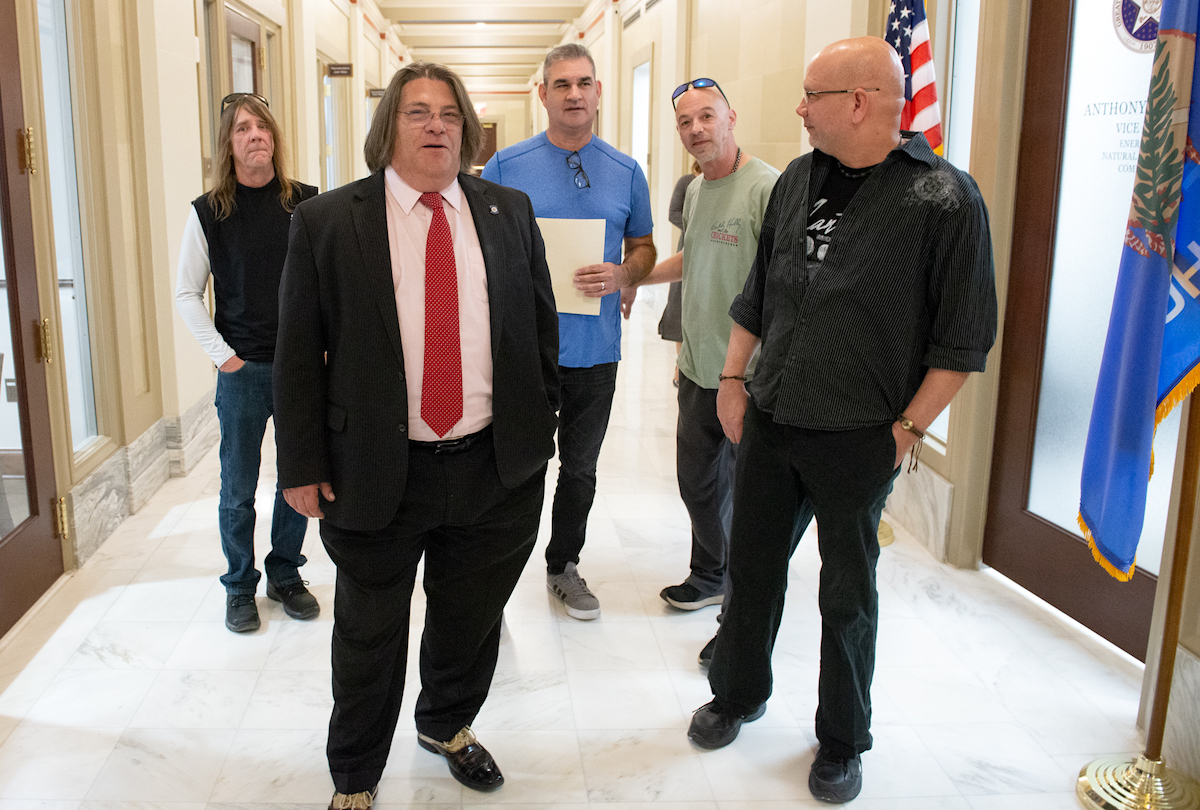

A new effort to legalize marijuana in Oklahoma for adult recreational use gets underway today, as organizers behind State Question 820 can begin gathering signatures that they hope will put the issue before voters in November.
SQ 820 would allow adults age 21 and up to legally purchase marijuana from dispensaries without a medical license. It would not alter the rights of those currently in the state’s medical marijuana program.
It would also impose a 15 percent excise tax on purchases to fund the Oklahoma Medical Marijuana Authority. That tax would also be divided up in several other ways, including some funds for schools, court systems and drug-addiction treatment programs. Medical marijuana patients would not be subject to the tax.
SQ 820 would also provide judicial process for people to seek “modification, reversal, re-designation, or expungement of certain prior marijuana related judgments and sentences.”
SQ 820 would be codified in Oklahoma statutes, but two other initiative petitions awaiting final approval to begin signature collection would change the Oklahoma Constitution. State Question 818 would establish a State Cannabis Commission that would replace the OMMA and guarantee access to medical marijuana in the Oklahoma Constitution. State Question 819 would legalize marijuana for those 21 and up for medical and recreational use and guarantee access in the Constitution.
It’s unclear when organizers behind those the SQ 818 and SQ 819 efforts can begin gathering signatures. The number of required signatures is based upon the total number of votes cast at the last general election for the office of governor. For initiative petitions like SQ 820 that change Oklahoma statute, 8 percent of the total number of votes cast is required: 94,911 this year. For those that change the Constitution, 15 percent is required: 177,958 this year.
SQ 820 group optimistic it can get signatures
Those behind the SQ 820 petition have 90 days to gather their 94,911 valid voter signatures. That equates to an Aug. 1 submission deadline to reach the November ballot. Proponents came close to launching an effort to gather signatures for a recreational marijuana pandemic in early 2020, just as the COVID-19 pandemic began.
Michelle Tilley, one of the SQ 820 organizers, said the pause allowed for language in her petition to be refined.
“COVID hit, and it killed our last effort, but it also gave us time to work with the Legislature and others in the industry who didn’t like all of the provisions,” Tilley said.
Tilley said the timing was right to start the effort again.
“We’ve seen nothing but growth and support behind the marijuana industry, and I think people realized after medical has come into place that it has the potential to be an area of economic growth in Oklahoma,” she said. “And we’ve also seen a lot of reform that has happened with the current medical system. We’ve been able to chip away at some of those issues, but we have a long way to go.”
While some have said the state’s low barrier for entry makes the medical program serves akin to a recreational system, Tilley pushed back against that idea.
“We understand and know that medical patients need to be recognized as patients and that there are many genuine health benefits that are alleviated with marijuana on the patient side,” Tilley said. “But we should have distinctions between those who use for medical reasons and those who are interested in recreational use. There are a lot of Oklahomans who are interested in recreational use but don’t want to go through the patient process.”
Tilley said SQ 820 also addresses some criminal justice issues that continue to impact Oklahomans, even as some municipalities relax their laws about marijuana possession.
“There is a very strong criminal justice component to it,” Tilley said of SQ 820. “It was one of the biggest driving forces behind the effort to start with. We are still seeing stories of people sitting in jail for small amounts of marijuana. It’s still being used to enhance sentences.”
Tilley said signature collection will begin today. She said those wishing to sign can find more information at YesOn820.com.
“We have until Aug. 1, but we hope to be done well before that,” she said.
Fetgatter: ‘What I do favor is legalization’

Rep. Scott Fetgatter (R-Okmulgee) has helped to craft much of Oklahoma’s medical marijuana policy in the Legislature. He said the problem with the state question proposals is that they come at a time when the public is frustrated with the state’s medical marijuana industry and what is a perceived as a lack of enforcement.
“There are a lot of people who are very discouraged about the way the medical marijuana industry ended up going and look at it as a recreational program already,” he said. “When I talk to constituents about this issue, they will tell me specifically that we already have recreational marijuana. So I think the problem with the state question being on the ballot — or potentially several state questions on marijuana being on the ballot — is the general population is not angry with marijuana, they are angry with lack of enforcement, and they are angry with people who are just blatantly disobeying the laws, and so they are requesting us to clamp down.”
Fetgatter said the state questions also carry other risks. If they are not successful, he said that result would further complicate efforts to craft a legalization program through the Legislature.
“I’ve made this statement before: Once a state question becomes law in the state of Oklahoma, it’s not owned by the people who voted ‘Yes,'” Fetgatter said. “That state question is now the business of every Oklahoma citizen in the state. So everybody has a say in it, and a lot of people are very frustrated. So if you put a state question on the ballot and it passes, then you potentially unwind the things that we have done in the Legislature to try and reign it in and give OMMA more opportunities and more authority in the program. If it goes on the ballot and it fails, the Legislature will look at that as a mandate to crack down more on the industry. It will set that issue out several years.”
While he personally said he does not favor decriminalization of marijuana because of its current federal status, Fetgatter does favor legalization.
“I don’t favor decriminalization because until the federal government makes a move and legalizes cannabis, you are always going to have criminal activity, and I don’t favor decriminalizing that activity,” he said. “What I do favor is legalization so you can put more constraints around how the program works and you can stop worrying so much about who is smoking what and where on a park bench somewhere.”
Fetgatter said the state questions — SQ 818 and SQ 819 — that alter the state’s Constitution offer the Legislature little flexibility.
“The other two that are constitutional ballot measures, they give some leeway to the Legislature to legislate the program,” he said. “However, anytime something goes into the Constitution, the Legislature either can’t do anything to change any aspect of it or they are very limited. I would just encourage people to think about State Question 788. Had that been a constitutional state question, we wouldn’t have been able to do anything to what happened, and so if I had my druthers I would rather it be statutory so we can continue to work with industry to set the program up effectively and efficiently. But I think it’s a risk for any of those three to be on the ballot.”
Follow @NonDocMedia on:
Jed Green: ‘We believe in ballot access’
One of the organizers behind SQ 818 and SQ 819 said Monday that he hopes to be able to start gathering signatures by the end of the month, pending approval from the Oklahoma Secretary of State’s Office.
Jed Green said the primary difference between his state questions and SQ 820 centers around guaranteed rights.
“Rights and freedoms aren’t rights and freedoms until they are guaranteed by the Constitution,” Green said. “In ours, ultimately, while they are constitutional amendments, we have sections that designate other sections that can be adjusted by the Legislature. It’s not an all or nothing proposition.”
Green said he wouldn’t discourage people from signing a petition to put SQ 820 on the ballot, however.
“We believe in ballot access,” he said. “Everyone go out and sign every petition there is.”
Still, Green acknowledged it could be confusing for Oklahomans if three petitions are circulating at once regarding marijuana.
“It may be, it may not be,” Green said.
But he said he believes the process behind SQ 818 and SQ 819 was more transparent than the effort behind SQ 820.
“They filed two months after we did and never got any of our input into their bill,” he said. “On the contrary, 818 and 819 were written in a public process over the course of four months. Everyone was invited. We reached out to state agencies and legislators. Community folks. Industry folks. It was a community effort.”




















